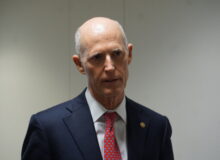By John O’Connor
While traditional thinkers value open debate, Progressives seek to squelch any discussion which might undermine even the silliest of their initiatives. Their most potent debate-ending tool is the charge of “conspiracy theory” regarding any idea deemed heretical to Progressive orthodoxy.
Because of their views antithetical to those of conservatives regarding debate, virtually all claims of “conspiracy theory” are made by Progressives. Conservatives, really classic liberals, on the other hand, prefer open debate about who is right and wrong, and therefore do not normally sling this thought-quelling epithet about ideas they think uncompelling. Indeed, they wish to encourage, not discourage, the active testing of ideas. To traditional thinkers, a poorly reasoned argument is strong or weak. Labeling it a “conspiracy theory” does not advance the ball, but only stops it.
But the use of the phrase is helpful to Progressives because it shames the proponent and warns off those who might be inclined to accept non-Progressive arguments, but who as well fear the scorn of the authoritarian intelligentsia.
Given these asymmetric debate philosophies, I thought I would enjoyably spur discussion about the Progressive quashing of debate through the meaningless phrase “conspiracy theory.”
I therefore published a piece in the Daily Caller, which it labeled by adding my name to the op-ed’s title, Which Conspiracy Theories Are Actually True?
The article pointed out that on major societal issues, it has been the Progressive Left which has in fact incubated false conspiracy theories, while claiming all opponents were the actual conspiracy theorists. While there is no doubt but that kooky, tin-foil hat conspiracists can push fringe ideas (e.g., there was no moon landing), rarely taken seriously, my article showed that time and time again, Progressives, not conservatives, have sponsored false conspiracy theories affecting important issues, while accusing their opponents of inventing conspiratorial drivel.
For just one instance, “Russiagate” was a silly conspiracy theory, albeit one not widely bought by sensible citizens. This vapid, but seriously advocated, story occupied over two years of intense civic attention on the central question of 2016 election interference through Donald Trump’s assertedly treasonous foreign contacts with the repugnant Vladimir Putin. Of course, the narrative, as any intelligent observer could have discerned within twenty minutes on the internet, was nonsensical.
But few conservatives or moderates today call this canard a baseless conspiracy theory, even though so labeling it would shame all self-styled intelligentsia who uncritically swallowed it. I pointed out other Progressive claims lacking common sense, such as the head-scratching notion that anybody who believed that the artificially patched coronavirus might have been engineered by, and escaped from, a nearby bio-engineering lab, was an unintelligent conspiracy theorist, while the exact opposite was true.
Did the article inspire what I had hoped, to wit, a lively discussion about the discussion-ending, speech-killing, epithet of “conspiracy theory”? Of course, it did not, because such a dialogue would render impotent any future elitist charge of “conspiracy theory”, raising the question that any counterintuitive societal prescriptions of Progressives just might be, yes, another one of their conspiracy theories.
Interested in whether and how my argument provoked discussion, I searched for the article on Yahoo and Google. Originally, the piece showed up not only with reference to the Daily Caller site, but also was shown as republished on four or five other sites. It was easily searched without including my name, simply by inputting “Which conspiracy theories are actually true.” The search also brought up other articles about conspiracy theories, mostly by smug leftists pontificating about wild theories circulated among the uneducated. In any case, so far, so good about starting a debate.
But a week later, I searched under the same terms, “Which conspiracy theories are actually true?” Oddly, my piece was nowhere to be found on either search engine, even though the same plethora of smugly professorial articles with vaguely similar but not identical titles were shown. Only by searching by my name did the article come up, and at that only on Google, and only as to the Daily Caller site.
Any future researcher delving into conspiracy theories will therefore find only articles condescendingly pointing to silly paranoic constructs, accompanied often by the suggestion that they are largely coming from conservative underclass sources. But any analysis of wrong-headed elitist claims, about truly important questions, will be avoided.
In short, by shadow-banning articles written from a conservative viewpoint, these search engines seek to preserve the myth that only supposedly crazy “right wing” citizens harbor foolish narratives, while sober rationality is the exclusive domain of cosmopolitan elites.
Meanwhile, targeting the better educated populace, the Progressive Left continues to attempt gaslighting it into reluctant acceptance of jejune constructs: the coronavirus came from a wet market; Donald Trump and Vladimir Putin had a well-developed conspiracy of electoral interference; the 2020 election was the “most secure” in our history; democracy’s greatest threat is from “MAGA” adherents; the world will end in nine years unless we all commit to spending trillions on ineffective climate remedies; there can be no intelligent concern about the side effects of a COVID vaccine; Vladimir Putin is responsible for high gas prices (even though he has not restricted his drilling, as did Biden); inflation will be curbed by a trillion dollar Inflation Reduction Act; the Hunter Biden laptop was Russian disinformation; an open border is really economically beneficial, contrary to crazy conservatives; not prosecuting criminals will reform them and make us safer, academic research proves; defunding the police will protect vulnerable minorities. And on and on.
These pronouncements have not been seriously debated among the herd-mentality Progressives and their camp followers. But if it were publicly suggested by a prominent leftish media site that any of the above narratives are idiotic, to the point of being baseless conspiracy theories, perhaps a larger number of moderate citizens would in the future critically examine each such assertion, and not be so easily duped.
But this will not happen if any suggestion that Progressives often sell senseless narratives, such as per the article you are now reading, is ignored, or widely dismissed as, yes, just another conspiracy theory.
So, here is one conspiracy theory that appears to be true, and should be debated: among well-educated citizens, it is mostly the far Left, not conservatives, who are disingenuous about our most important issues, thereby advocating false conspiracy theories. With such a debate, perhaps we can agree that discussion of our important issues should be energetic, full and open, unencumbered by speech-chilling accusations, and that therefore the unedifying label “conspiracy theory” should pass to its final reward, and be respectfully interred.
John D. O’Connor is a former federal prosecutor and the San Francisco attorney who represented W. Mark Felt during his revelation as Deep Throat in 2005. O’Connor is the author of the books, Postgate: How the Washington Post Betrayed Deep Throat, Covered Up Watergate and Began Today’s Partisan Advocacy Journalism and The Mysteries of Watergate: What Really Happened.
Tags: Commentary




















Join the conversation!
We have no tolerance for comments containing violence, racism, vulgarity, profanity, all caps, or discourteous behavior. Thank you for partnering with us to maintain a courteous and useful public environment where we can engage in reasonable discourse.